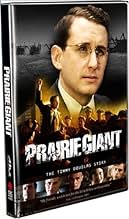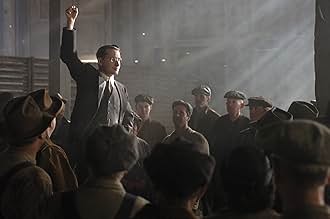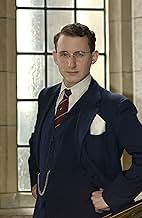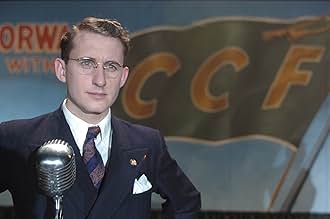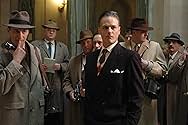Ajouter une intrigue dans votre langueA mini-series based on the work of Canadian political icon Tommy Douglas.A mini-series based on the work of Canadian political icon Tommy Douglas.A mini-series based on the work of Canadian political icon Tommy Douglas.
- Récompenses
- 2 victoires et 10 nominations au total
Parcourir les épisodes
Avis à la une
9dm88
"Prairie Giant" is a very good film about the great Canadian social democrat Tommy Douglas, the creator of the first Medicare system in North America, along with the first provincial government leader to sign into law a bill of rights and to legally guarantee collective bargaining in all sectors of the economy. Douglas was a witty and clever speaker, and Theriault does a good job at conveying his oratorical skills. The usual minuscule CBC budgets aren't noticeable here. A few of the minor actors don't seem terribly well cast: Paul Gross as Diefenbaker, Andy Jones as Mackenzie King, though they give it the old college try. Yet Don McKellar is good as Saskatchewan's finance minister, as is Kristin Booth as Irma Douglas, Tommy's wife. Douglas' final speech to the 50th Anniversary meeting of the CCF about the greed of private enterprise still rings true today in our globalized, McDonaldized, corporatized world.
It would have been nice to see the political struggles of the late 1960s and 1970s, which were skipped over the film, but these were sacrificed to show the struggle over Medicare in detail. You might have thought this would be a somewhat dull three hours... yet it could easily have filled five hours and kept my attention. We need more films like this from the CBC.
It would have been nice to see the political struggles of the late 1960s and 1970s, which were skipped over the film, but these were sacrificed to show the struggle over Medicare in detail. You might have thought this would be a somewhat dull three hours... yet it could easily have filled five hours and kept my attention. We need more films like this from the CBC.
Very interesting movie in 2-parts about Tommy Douglas. He's the father of medicare in Canada, but so much more. This mini-series (4 hours total) tells the story of a great Canadian. In fact, he was voted the greatest Canadian by the citizens of this country a couple of years ago. Unfortunately, his work and accomplishments are not well enough known by ordinary Canadians. That's why this mini-series is so important. It helps that Michael Therriault is doing a terrific job as T.C. Douglas. It helps also that the supporting cast is great. And the use of archives adds on to the story. Too bad though that the mini-series focuses almost entirely on the creation of medicare. A longer series was perhaps needed.
Seen at home, in Toronto, on March 12th and 13th, 2006.
81/100 (***)
Seen at home, in Toronto, on March 12th and 13th, 2006.
81/100 (***)
The film is shamelessly emotional and still pulls it off, because the material is strong. By no means perfect. It sneaks up on you and is, at times, a full-on, hanky-worthy tear jerker. My most cynical friends reluctantly admitted they cried their eyes out. How often do you get to say that about a 4-hour CBC biopic? Far beyond the film, Tommy's worth a ten on his own merits. (So I can only give it a nine.) He is unquestionably a hero of the left, but he is also a hero for anyone who believes in balanced budgets and debt reduction.
Scratch that. Debt elimination.
He's a hero for anyone who thinks politicians should campaign on what they intend to do, and then do what they campaigned on. He's a hero for anyone who thinks government ought to be transparent and accountable. He actually managed to deliver ambitious yet ruthlessly efficient government service. Sometimes government is the problem. Not this time. This time government was transformative.
Like John Diefenbaker and John A. MacDonald, he is a man who changed his country beyond any reasonable expectation.
How the hell do you turn that into a series of compelling scenes with even remotely engaging characters? Good luck.
And yet the movie is so much better than you think it is. Especially the second part, which by all rights should flounder and die like a baby seal in a Greenpeace ad. But it creeps up on you until it absolutely soars. Look at the person beside you. One of you is probably going to cry.
Politics? Emotional? Inspiring? This Baptist preacher from the 30's is, in the end, shockingly relevant? Who woulda thunk? Not that I would pretend to be objective.
Scratch that. Debt elimination.
He's a hero for anyone who thinks politicians should campaign on what they intend to do, and then do what they campaigned on. He's a hero for anyone who thinks government ought to be transparent and accountable. He actually managed to deliver ambitious yet ruthlessly efficient government service. Sometimes government is the problem. Not this time. This time government was transformative.
Like John Diefenbaker and John A. MacDonald, he is a man who changed his country beyond any reasonable expectation.
How the hell do you turn that into a series of compelling scenes with even remotely engaging characters? Good luck.
And yet the movie is so much better than you think it is. Especially the second part, which by all rights should flounder and die like a baby seal in a Greenpeace ad. But it creeps up on you until it absolutely soars. Look at the person beside you. One of you is probably going to cry.
Politics? Emotional? Inspiring? This Baptist preacher from the 30's is, in the end, shockingly relevant? Who woulda thunk? Not that I would pretend to be objective.
I was upset to see that this movie did not give credit where credit is due. That is, Matthew Anderson was not named as co-creator of the health care system in Canada. Matt Anderson took a small step for his rural municipality of McKillop which became a giant leap for our nation.
In 1939, at the provocation of Matt Anderson of Regional Municipality McKillop, the Municipal and Medical Hospital Services Act was enacted, allowing municipalities to levy a personal tax to finance medical services. When the CCF government came to power in 1944, their platform called for comprehensive health insurance. The Hospital Insurance Act came into effect on January 1, 1947, ensuring every citizen of the province hospital care without a charge. Tommy Douglas insisted on a small annual premium to help finance this insurance. The introduction of hospital insurance in Saskatchewan paved the way for the introduction of medical insurance.
I encourage you to do an internet search for Matt Anderson of Bulyea, Saskatchewan to discover why he should be known as the "Grandfather of Medicare" in Canada.
In 1939, at the provocation of Matt Anderson of Regional Municipality McKillop, the Municipal and Medical Hospital Services Act was enacted, allowing municipalities to levy a personal tax to finance medical services. When the CCF government came to power in 1944, their platform called for comprehensive health insurance. The Hospital Insurance Act came into effect on January 1, 1947, ensuring every citizen of the province hospital care without a charge. Tommy Douglas insisted on a small annual premium to help finance this insurance. The introduction of hospital insurance in Saskatchewan paved the way for the introduction of medical insurance.
I encourage you to do an internet search for Matt Anderson of Bulyea, Saskatchewan to discover why he should be known as the "Grandfather of Medicare" in Canada.
I am probably the only person on this string of comments who actually met Douglas. That said, I acknowledge the sincere effort of the producers of telling an important historical story, but I was utterly shocked by the inaccurate depiction of Jimmy Gardiner as an ultra right-wing ogre. Despte what you saw in this film, Gardiner was a teetotaler and a defender of oppressed minorities (Eastern European immigrants during the heyday of the Ku Klux Klan in the late 1920s and the On-to-Ottawa trekkers in the summer of 1935). There has been much controversy in Saskatchewan over the sadistically inaccurate depiction of Gardiner. Also, the Estevan coal miners strike of 1931 was inaccurately depicted: the bodies of the dead were not left to rot and Douglas and his wife were not in the area at the time. Moreover, Gardiner was not the premier at the time and did not, despite what you saw in the movie, order the shooting or exult in the miners' deaths. On and on and on go the list of historical errors, all of which just happen to aggrandize Douglas and his party.
What this movie "got right" was the important role of provincial finance minister Clarence Fines and cabinet minister Woodrow Lloyd during Douglas' term as premier. Actor Michael Therriault did an exceptional job of capturing Douglas' personality and speaking style.
There is a school of thought here in Saskatchewan that Douglas did as much harm as good...by waging war on business so effectively, he provoked it into a six-decade boycott of Saskatchewan, setting the stage for relatively few jobs. It has taken 60 years for another NDP government (see the April 6, 2006 budget brought down by NDP premier Lorne Calvert) to reverse years of anti-business rhetoric and policy--and throw open the doors to the private sector.
Among Canadian leftists, there is something akin to a cult around Douglas' life and deeds that prevents an objective, balanced analysis of his legacy. This ambitious but flawed feature will not make that consideration any easier.
What this movie "got right" was the important role of provincial finance minister Clarence Fines and cabinet minister Woodrow Lloyd during Douglas' term as premier. Actor Michael Therriault did an exceptional job of capturing Douglas' personality and speaking style.
There is a school of thought here in Saskatchewan that Douglas did as much harm as good...by waging war on business so effectively, he provoked it into a six-decade boycott of Saskatchewan, setting the stage for relatively few jobs. It has taken 60 years for another NDP government (see the April 6, 2006 budget brought down by NDP premier Lorne Calvert) to reverse years of anti-business rhetoric and policy--and throw open the doors to the private sector.
Among Canadian leftists, there is something akin to a cult around Douglas' life and deeds that prevents an objective, balanced analysis of his legacy. This ambitious but flawed feature will not make that consideration any easier.
Le saviez-vous
- AnecdotesThe wolf from Paul Gross's series Due South, Diefenbaker, was named after John G. Diefenbaker, who was Canada's 13th Prime Minister, which is the role played here by Gross.
- GaffesIn Tommy Douglas's first election campaign in the 1930s, he is shown using his famous Mouseland speech. In reality, that speech was first given in 1961.
- Citations
Tommy Douglas: My friends, watch out for the little fellow with an idea.
- ConnexionsReferenced in Corner Gas: Bend It Like Brent (2008)
Meilleurs choix
Connectez-vous pour évaluer et suivre la liste de favoris afin de recevoir des recommandations personnalisées
Détails
- Date de sortie
- Pays d’origine
- Sites officiels
- Langue
- Aussi connu sous le nom de
- Povestea lui Tommy Douglas
- Lieux de tournage
- Société de production
- Voir plus de crédits d'entreprise sur IMDbPro
- Couleur
- Rapport de forme
- 1.78 : 1
Contribuer à cette page
Suggérer une modification ou ajouter du contenu manquant


